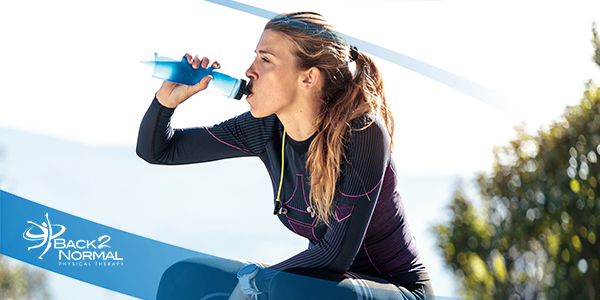
Contributing Author: Jillian Warwick, Integrative Holistic Health Practitioner
When fueling your body during intense training or on race day, it’s best to choose foods and beverages that are nutrient-dense and energy-supplying, and that will promote ideal performance and enhance recovery. And while bio-individuality is key, there are a few simple guidelines as to what to include and exclude to help you perform your best and stay on track toward your goals.
What types of food should you INCLUDE?
BLENDED FOODS
When you blend foods, you make things much easier on your digestive system, allowing foods to empty more quickly from the stomach. Blending also helps to pre-digest the food so your body doesn’t have to work as hard during digestion. This frees up precious energy for you to be able to devote to breathing, moving, and contracting muscles.
EASILY DIGESTIBLE CARBS, FATS & PROTEINS
Carbohydrates such as white potato, sweet potato, yam, taro, and white rice are tolerated best by most athletes before hard workouts. Fats such as MCT oil (start slow and low with this one!), coconut oil, and coconut butter (all sources of medium chain triglycerides) bypass the normal process of digestion and get absorbed directly by the liver, providing a quick source of energy. Proteins such as hydrolyzed collagen protein, bone broth protein, hydrolyzed whey protein, and essential amino acid supplements are the most easily digested and assimilated prior to intense activity.
What types of food should you EXCLUDE?
FODMAPs
Short for “Fermentable Oligosaccharides, Disaccharides, Monosaccharides And Polyols”, FODMAPs are forms of carbohydrates and sugar alcohols that can be poorly absorbed in the small intestine, and pass through to the large intestine, where they feed bacteria, and may create excess gas, abdominal bloating and distension, abdominal pain, constipation or diarrhea, or a combination of both. A few specific FODMAPs to steer clear of are wheat, dairy, and fermentable fruits (like apples and pears). Many popular sports nutrition supplements also include high amounts of FODMAPs in the form of fructose and maltodextrin.
ARTIFICIAL SWEETENERS & CHEMICALS
Aspartame, Sucralose, Acesulfame K, Saccharin, Xylitol and Sorbitol are some of the most popular artificial sweeteners on the market; and are known to cause a range of unhealthy side effects – from gut bacteria imbalance, to digestive distress, to brain fog (acting as neurotoxins). Artificial sweeteners can be found in prepared foods, medications and beverages; including, but not limited to: toothpaste and mouthwash, children’s chewable vitamins, cough syrup and liquid medicines, chewing gum, zero-calorie waters and drinks, alcoholic beverages, salad dressings, desserts and candies, baked goods, yogurt, breakfast cereals, processed snack foods, diet fruit juices and beverages, and prepared meats. It’s important to read the labels of everything you consume, to avoid deleterious effects on race day and to promote long-term health.
AND EQUALLY AS IMPORTANT…
How should you HYDRATE?
Consuming the correct amount of the proper nutrients at the ideal time is key for athletes, and performance is compromised with both excess and deficiency. This concept also applies to hydration, where detrimental effects can occur on both sides of the equation. Drinking too little or too much can have performance-inhibiting effects. For shorter-duration exercise, drinking to thirst is the best recommendation. Drink throughout the day, and keep water on hand; but remember, you can only absorb so much water. If you have to relieve yourself every 30 minutes, you’re likely just flushing fluids thru – and minerals out – of your tissues. Never force yourself to drink, and keep in mind, hydration is more than just H2O. Eat plenty of high water-content fruits and veggies, and don’t be afraid of quality salt. Salt your food to taste, and add a pinch of mineral-rich salt to your water for best absorption and electrolyte balance – or try one of the “Simply Better Sports Drink” recipes below.
SIMPLY BETTER SPORTS DRINKS
Try one of these super simple recipes for a homemade, hydrating, and nutrient-boosting beverage.
Coconut-Lime Refresher
- 3 cups coconut water
- 1 cup filtered water
- 1/2 cup lime juice
- 2 tbsps raw honey or pure maple syrup
- 1/4 tsp sea salt trace mineral drops (optional)
Lemony Uplifter
- 4 cups filtered water
- 1/2 cup lemon juice
- 1/4 cup raw honey or pure maple syrup
- 1/4 tsp sea salt trace mineral drops (optional)
ABOUT THE INGREDIENTS
Coconut water contains 13x more potassium (a key electrolyte necessary for proper cell function) than Gatorade. Look for a brand without additives or preservatives. Freshly pressed juices, such as lemon & lime, contain vitamins and enzymes that help maintain energy during activities and help speed recovery after. Raw honey and pure maple syrup are both rich in minerals and easily digestible sugars, which can be used for quick energy. Mineral-rich salt (Redmond Real Salt is our favorite!) is full of electrolytes and minerals. Plus it plays an important role in balancing the stress hormones during exercise. Salt reduces adrenaline levels and supports overall metabolic health. Trace mineral drops add to the electrolyte content; and due to soil depletion, many of us don’t get enough in our food, so supplementation can be very beneficial.
Ready to optimize your diet and lifestyle with one of our trained and trusted professionals? Seek advisement with our specialists, and let us guide you with the most effective practices for your unique needs! We offer a wellness-focused and supportive environment that can help you achieve your goals. Be sure to check our social media and blog updates for regular wellness inspiration, information, offers, and support.
The Back 2 Normal blog is an educational resource written by Back 2 Normal employees and professional associates. Back 2 Normal bloggers are professionals who abide by the code of ethics outlined by their respective professional associations. The content published in blog posts represents the opinion of the individual author based on their expertise and experience. The content provided in this blog is for informational purposes only, does not constitute medical advice and should not be relied on for making personal health decisions.






